For more than six decades, Ernie Harwell delighted radio listeners and television viewers with his
homespun charm, simple powers of observation and becalming tone.
While he covered everything from the NFL to the Masters, Ernie's
name is synonymous with Detroit Tigers baseball. Countless fans
throughout the Motor City—where he broadcast his first game
in 1960—grew up on his signature "Lonnnng Gone"
home run call. His voice evoked vivid memories of Tiger heroes from Kaline and Cash to Trammell and
Whitaker.
Had Ernie
had his way, one of baseball's signature voices might never have
reached the airwaves. Born on January 25, 1918 in Washington,
Georgia, the legendary play-by-play man first dreamed of being
a sportswriter. Though he eventually settled in behind the microphone,
Ernie also found time to pen more than 50 songs—recorded
by artists such as Mitch Ryder, B. J. Thomas, and Barbara Lewis.
The 1981 recipient
of the Ford C. Frick Awards by the Baseball Hall of Fame for broadcasting
excellence, Ernie is also a member of the National Sportscasters
Hall of Fame, the Michigan Sports Hall of Fame and the Radio Hall
of Fame. Sadly, on May 4, 2010, he died after a months-long battle with cancer. Several years earlier, the venerable broadcaster talked to contributing editor
Mike May about his life and times in sports.
|

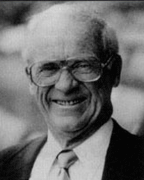
Ernie Harwell
|

What was it
like growing up in the South in the ’30s?

I was born in Washington, Georgia, which is about 120 miles east
of Atlanta. My family moved to Atlanta when I was about four.
I lived there until 1948. In my early years, my dad was a great
baseball fan. He inculcated in me a love of baseball and other
sports. My father had Multiple Sclerosis, and didn't work after
he was about 32. He lived to be 72.
My mom supported the family by making cakes and sandwiches. I
helped out by selling newspapers. I had a paper route, and also
sold things like magazines and Christmas cards.
I
grew up as a real sports fan. I was a bat boy for the Atlanta
Crackers, or sometimes for the visiting team. When I was in high
school, I wrote to The Sporting News, and suggested that
I should be the Atlanta correspondent. The editor wrote back and
gave me the job. He didn't t know that I was only 16 at the time.
Then I got a job with The Atlanta Constitution. I worked
there six years, while I was in high school and college.
My
real ambition was to be a sportswriter. When I got out of Emory
University, there weren’t any jobs open on the paper, so
I opted for radio. I took an audition at WSB in 1940., and got
lucky and won it. They gave me a job in May, and I’ve been
in radio or TV ever since, except for four years in the United
States Marine Corps. So, I’ve been in it a long time. It’s
been a great life for me. God blessed me with some talent and
great health, and I’ve been very fortunate.
|
|

Most people
associate you with the Tigers, but you’ve been affiliated
with many other clubs. Tell us about the teams you’ve called
games for over the years.

Well, it started when I came back from the Marines. I became the
permanent announcer for the Atlanta Crackers, which was my old
hometown team. I thought that was just great. I worked there in
1946 and 1947. In 1948, Red Barber became ill, and Branch Rickey,
his boss, contacted my boss, Earl Mann. He wanted me to replace
Red with the Brooklyn Dodgers. Mr. Mann said he had me under contract.
He told Mr. Rickey, “If you really want him, I’ll
make a trade. You send me your catcher, Cliff Apper, from Montreal
and I’ll send you Ernie.” So, to get to the big leagues,
I was traded for a minor-league catcher.
I
stayed with the Dodgers for two years. This was at the height
of the “boys of summer”—Jackie Robinson and
all the great players. Jackie won the National League MVP in 1949,
my second year there, and the Dodgers won the pennant. I got a
pretty good offer from the New York Giants, so I moved over there
and worked for four years with Russ Hodges. I was there when Willie
Mays broke in and when Bobby Thomson hit his famous home run.
I was on NBC-TV, but the famous call you hear was Russ Hodges
on the radio. Nobody recorded TV back then, so only Mrs. Harwell
and I know I was on that afternoon. I just said, “It’s
gone.” It was a great thrill for me.
Then,
in 1954, I went to Baltimore Orioles, when they came into the
American League. That was interesting, because I was starting
on the bottom floor with a new team. Everyone was excited about
having a big-league franchise in Baltimore. They didn't t have
much of a team, but the people there were great.
Detroit
hired me in 1960, after the 1959 season.
|
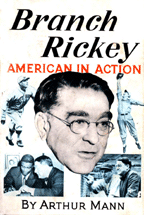
Branch Rickey book |

You’ve
visited just about every ballpark in the majors. What are your
favorites, both as a broadcaster and a spectator?

I think that the old Tiger Stadium is my favorite because I spent
so much time there. You were right down close to the players,
where you could see them sweat and hear them cuss. Fenway Park,
I think, is everybody’s favorite.
Of
the newer ones, I really love the stadiums that have the ambience
of the old-fashioned ballparks, plus all the modern conveniences—Camden
Yards, Coors Field, Jacobs Field, and the Ballpark in Arlington.
They’re all really great. They give the fans a terrific
time at the “old ballpark.”
|
|

Speaking of
the new generation of stadiums, what are your thoughts on them?

I like the new stadiums. The retro look is great. They have been
designed to bring the fans closer to the action. Bringing the
grandstands closer to the diamonds has made baseball more fan-friendly.
The new stadiums are well-built, in downtown locations, and have
great amenities. Camden Yards seems to be the general model which
the others have followed—though that ballpark is too favorable
to the hitters! My personal favorite is Safeco Field in Seattle.
It’s a neat place because of the ability to cover the field
in case of inclement weather. I haven’t seen the stadiums
in Pittsburgh or Houston, though I’d like to see them one
day.
|
|

You mentioned
that you saw Bobby Thomson’s historic home run in 1951.
Talk about some other great moments that you’ve witnessed.

I was there when Willie Mays broke into baseball. That was sort
of a kick for me because I didn't t feel that it took a genius
to know that this guy was going to be a pretty good ball player.
I think he’s the best player that I’ve ever seen as
a broadcaster.
One
of my favorite calls was in Game 7 of the 1968 World Series. There
was no score in the top of the 7th inning and the Tigers were
playing the Cardinals in Busch Stadium. Bob Gibson was pitching
for St.Louis and Mickey Lolich for Detroit. Willie Horton and
Norm Cash were on with two outs, and Jim Northrup hit a two-run,
two-out triple to give the Tigers a 2-0 lead. They went on to
win the game, 4-1, and the World Series title.
The
1984 World Series was great when the Tigers beat San Diego. In
the final game, Kirk Gibson hit a couple of home runs.
I announced all the playoffs for CBS beginning in 1976. Every
time there was a big post-season game, I was there. I also did
the one-game playoff in 1978 between the Yankees and Red Sox,
when Bucky Dent hit the home run off Mike Torrez. That was a big
thrill.
Some of the other playoff games I’ve done were terrific.
One of the more recent ones was when Seattle won on a hit to rightfield
by Alex Rodriguez that scored Ken Griffey with the winning run.
Of course, every time you go to the ballpark, it’s a big
thrill.
|
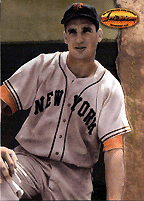
Bobby Thomson, 1993 Ted Williams |
| 
How would
you rank moments like Denny McClain’s 31-win season and
Al Kaline’s 3,000th hit?

Those were great—though Kaline’s was more of an individual
moment that didn’t really affect a pennant race.
Denny’s
30th victory was sort of a spectacle at Tiger Stadium. He beat
the Oakland A’s.
Kaline
got his 3,000th hit in his hometown of Baltimore, which was pretty
interesting. It was a double down the rightfield line. Both were
big thrills for me. I enjoyed seeing those guys perform because
they’re the very best in the world.
|
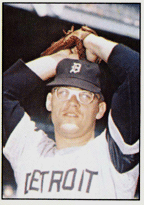
Denny McClain, TCMA The 1960s |

Let’s
focus a little bit on technology for a moment. How has technology
affected your profession, especially in radio?

I don’t think that radio has really changed a whole lot.
The basics are still there. You’ve got a microphone, an
engineer, and a voice.
Television,
on the other hand, has made rapid strides. When I started in TV,
we didn’t have cable from coast to coast. If you called
a game in New York, they had to ship it to the West Coast. In
fact, the series I did in 1951 was the first sports series ever
telecast coast to coast. We were pretty basic back then. We had
a couple of cameras and one guy in the booth with us. Now, they
have these big trucks and 200 people working for you, plus all
the visuals that they use and everything else.
|
|

You’ve
worked with some great partners. Run down the list for us.

I started with Red Barber, who’s in the Baseball Hall of
Fame, and Connie Desmond, who was a great announcer. Connie and
really good to me in Brooklyn. When I went to the Giants, there
were only two of us there, Russ Hodges, who also made the Hall
of Fame, and me. We were partners for four years. In Baltimore,
my first partner was Howie Williams, then Chuck Thompson, who
came along later. Chuck’s a Hall of Famer, too. Next I had
a fellow named Larry Ray, who came in from Kansas City. There
was also Herb Carneal, another Hall of Famer.
When
I went to Detroit, my first partner was George Kell, the Hall
of Fame third baseman. We did radio and TV together. Bob Scheffing,
the old manager, and I worked one year together. Then Bob got
out of it. Gene Osborn and Ray Lane were two others who were great
partners.
The
fellow who worked with me the longest and had a terrific voice,
a great technique, and was a very conscientious worker was Paul
Carey. He teamed with me 18 years, and we had a great association.
All
these guys, you work with them and you work as a team. It’s
not Ernie Harwell—it’s Ernie Harwell and Paul Carey,
for instance. You’re never any better than the guy working
with you. So, you’re lucky when you have a good partner.
|
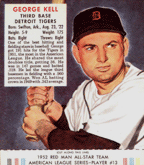
George Kell, 1952 Red Man |

Of today’s
broadcasters, who are your favorites?

There are so many good ones out there that it’s difficult
to answer that question. Veterans like Vin Scully and John Miller
are still doing a great job, as is my old buddy Herb Carneal,
a radio broadcaster with the Minnesota Twins. So many of today’s
broadcasters are only heard or seen on a regional basis. Unfortunately,
I don’t get a chance to hear or see them.
|
|

You’ve
done other sports besides baseball, including golf. Have you enjoyed
that work?

My golf work was pretty much restricted to the Masters. My first
year with WSB was 1940, and the next year the station sent me
down to Augusta. I did interviews and reports. At the time, we
were the largest station covering The Masters.
The
next year, NBC got the rights, and used Bill Stern. He had a fellow
named Bob Stanton from the network in New York who worked with
him. He was on one nine and I was on the other nine. It was very
primitive. We had an engineer with a bicycle with a basket. He
put an antenna in the basket and rolled the bicycle up and down
the hills.
We
would get a signal from Stern, then we’d call in and say
something like, “I’m Ernie Harwell at the fourth hole,
and Lawson Little, Ralph Guldahl, and Bobby Jones are coming on.”
We’d describe the action and send it back to Stern at the
tower. I went into the Marines for four years, and when I came
back I worked The Masters in 1946 with Stern.
|
|

You got to
know Bobby Jones in your earlier days while you were living in
Atlanta. What was your relationship with him?

I knew Bobby because we were both in Atlanta. O.B. Keeler was
a good friend of mine. He and Bobby were very close. If you knew
O.B., you knew Bobby. I think Bobby was the finest gentleman I
ever met in sports. He was so self-effacing, so modest, and yet
had great talent and was a fellow that everybody liked. He was
down to earth, but he had a dignity and class about him that few
people are ever able to achieve.
He
was willing to do anything. My first year with WSB doing the Masters,
we went on the air from Augusta stationed out at the tower. That
was only place to do the show, and it was about 200 to 300 yards
from the clubhouse. It was raining real hard, and Jones came out
and walked through the rain with me. He walked up the tower, which
wasn't t an easy feat, and stood there in the rain and did an
interview. He wouldn’t talk about himself at all. He wanted
to talk about the other golfers who were playing. He was a terrific
guy.
.
|
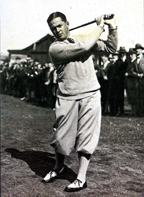
Bobby Jones trading card
|

Any downside
to a career like yours. It does take you away from home a lot,
especially during the summer, right?

That’s the downside. But my wife is so adaptable, and I
was in this business before we married. We’ve been married
for 56 years, so she was just great about understanding that I
was going to be on the road. We have a saying on the road: Never
call home, because there will be a crisis. She takes care of everything
when I’m away. She’s been so supportive. I owe a great
deal to her.
Outside
of that, I really don t think there are many downsides. I never
objected to travel like most people do. That’s what really
makes most announcers retire. They don t like to travel. They
don t like the idea of being on the road. But I have people I
see on the road. I just going to look at it this way—somebody’s
paying me to stay at a nice hotel, eat at a good restaurant and
go to a ball game. I’m not going to gripe about it; I’m
going to enjoy it! I always have.
|
|

Now that
you're retired, what do you do to keep busy?

My biggest challenge is to lift my feet when my wife runs the
vacuum cleaner near my foot rest! In all seriousness, I’m
a spokesman for Blue Cross & Blue Shield of Michigan. I have
a 10-year contract with them and an option for 10 more years,
so I need to live to 106 to fulfill my total contract. I also
write a column for the Blue Cross newsletter, and a column for
the Detroit Free Press for 27 weeks of the year. I also
appear on 20 promotional vignettes which are produced by Fox Detroit.
I do keep rather busy.
|
|

Lastly, you've
probably been asked this thousands of times: Where does your great
voice come from?

Well, I don’t know that I’ve got a great voice, but
whatever I’ve got, God gave it to me. I’ve never really
cultivated it too much. I took a few singing lessons when I first
started out at WSB. The station had an old Russian fiddle player
in the orchestra who taught the announcers singing and breathing
and things like that. Maybe that helped me a little bit. I’ve
just been fortunate to have the throat that God gave me and I’ve
tried to take care of it. I never wanted to be absent, because
it’s just not good to be away from the microphone.
|
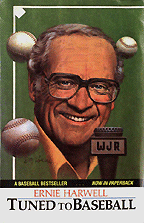
Ernie Harwell autobiography
|
| |
|
|







